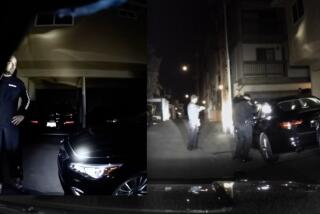San Diego leaders seek more study of alleged racial profiling by police

The San Diego Police Department is trying to assess whether its officers are guilty of racial profiling in traffic stops, as some community activists allege.
Statistics released this week suggest that black and Latino drivers are more likely to be pulled over than white drivers, and once stopped are more likely to be searched than white drivers who have been stopped.
“We have a racial profiling issue; it is here,” Mark Jones, a former Marine and leader of the Black Students Justice Coalition, told the City Council committee that oversees the police department. “The data shows the problem exists.”
In 2014, of 144,164 traffic stops, Latino drivers represented 30.2% and African Americans 11.2%, compared to census data that Latinos are 27% of the city’s adult population and African Americans 5.5%. Of the 7,142 drivers who were searched, 40.1% were Latinos and 23.4% African American.
Police Chief Shelley Zimmerman noted the difficulty of using such statistics to reach conclusions about racial profiling.
Still, the numbers taken from traffic stop data collected by patrol officers were sufficiently troubling for council members to call for additional study, possibly by academic researchers, although previous outside studies have been inconclusive.
“Being an African American female, this weighs heavy on my heart,” said Councilwoman Myrtle Cole, a former lieutenant in the community college district police force.
Councilwoman Marti Emerald, chair of the council’s Public Safety and Livable Neighborhoods Committee, has asked the San Diego State University’s school of public affairs to “conduct an independent academic research study.” The goal, she said, “is to improve trust and relations between our communities and our police.”
The idea of an outside review was also suggested by the ACLU.
Margaret Dooley-Sammuli, policy director of the San Diego and Imperial counties chapter of the ACLU, said the numbers presented to the council committee “failed to identify or explain why data suggests disproportionate stops and discretionary searches.”
Only a deeper review will provide analysis “that is meaningful to the crucial conversation on policing in San Diego,” she said.
No decision has been made, but City Council and San Diego State officials will meet soon to discuss what a study might involve, a university spokeswoman said Friday.
Among the faculty members at the school of public affairs is Joshua Chanin, an assistant professor whose specialty is studying officer misconduct and the relative transparency of police departments.
In her year as chief, Zimmerman has made eliminating racial profiling a priority, repeatedly warning officers that racial profiling can be a firing offense and meeting with community activists, including Jones and the ACLU, to hear complaints.
In August, she released a public service announcement encouraging motorists who believe they have been treated unfairly to speak up. She has ordered officers to stop routinely asking drivers whether they are on parole or probation and requiring drivers to sit on the curb while being questioned.
Zimmerman told the council committee that the department “is absolutely committed to the fair treatment of all members of our community.”
But the problem that stymied researchers a decade ago still persists, Zimmerman said: Census data do not include drivers who are undocumented, military members or visitors to San Diego from Mexico or elsewhere. As such, getting an accurate picture of the “driving population” for comparison is dubious, she said.
Zimmerman said she welcomes the idea of outside researchers and suggested they not just review the numbers but also interview officers and members of the community.
An update on the issue, including whether San Diego State will conduct a review, is planned for the committee’s March meeting.
“I know this is a tough subject,” Cole said, “but we need to continue addressing it, continue to talk about it, until this subject is eliminated at San Diego PD, period.”
More to Read
Sign up for Essential California
The most important California stories and recommendations in your inbox every morning.
You may occasionally receive promotional content from the Los Angeles Times.









